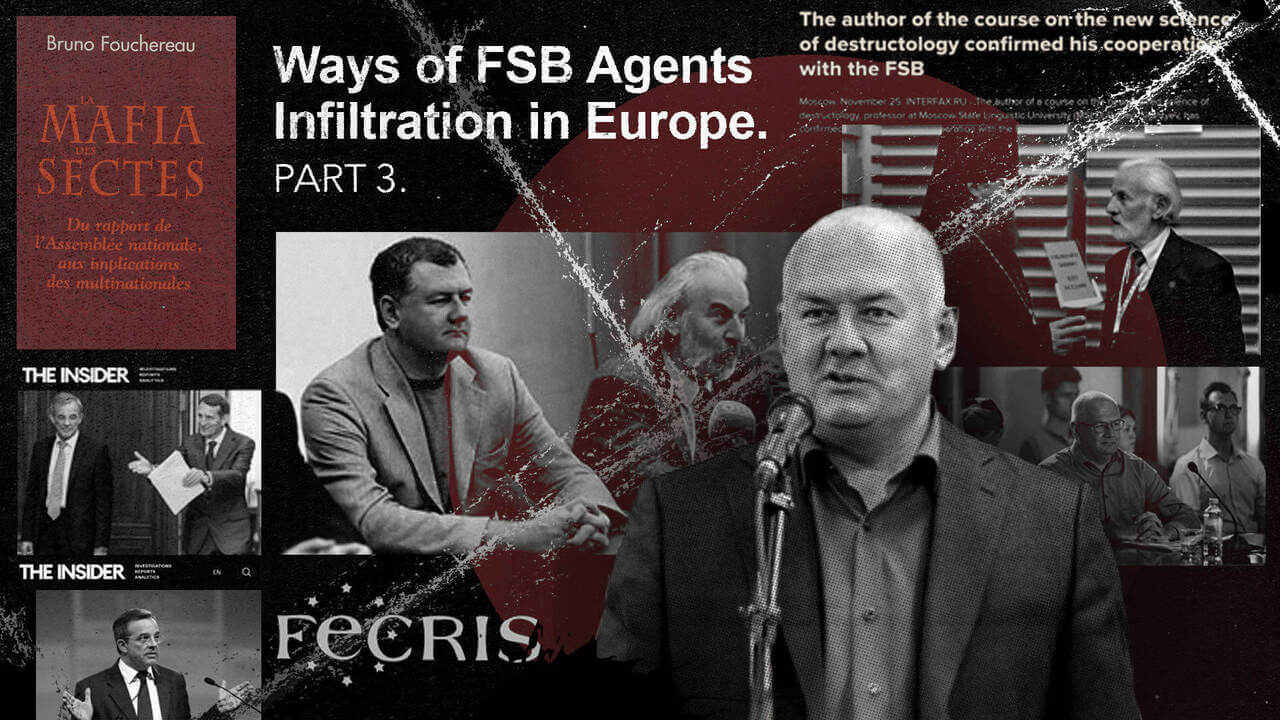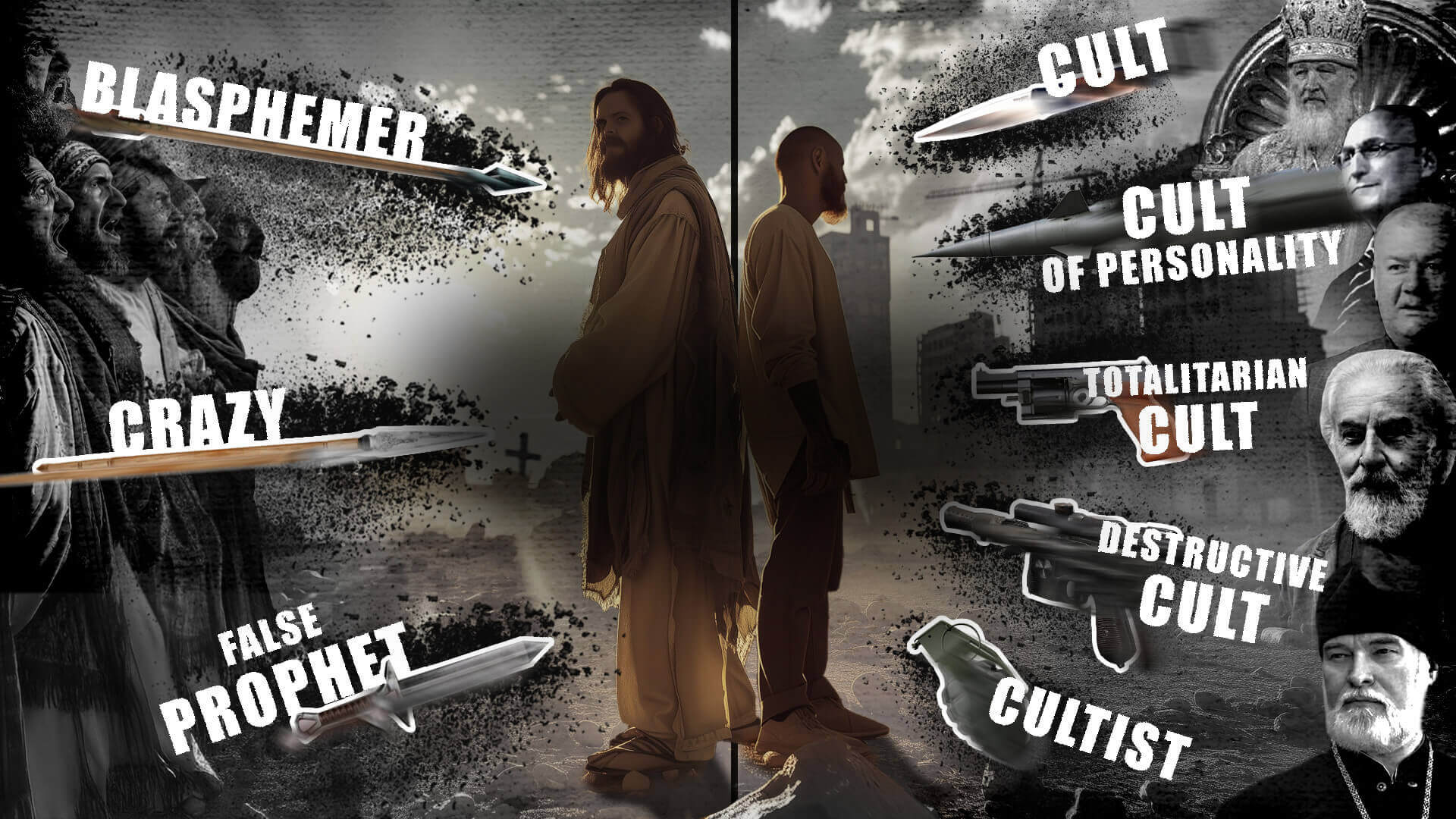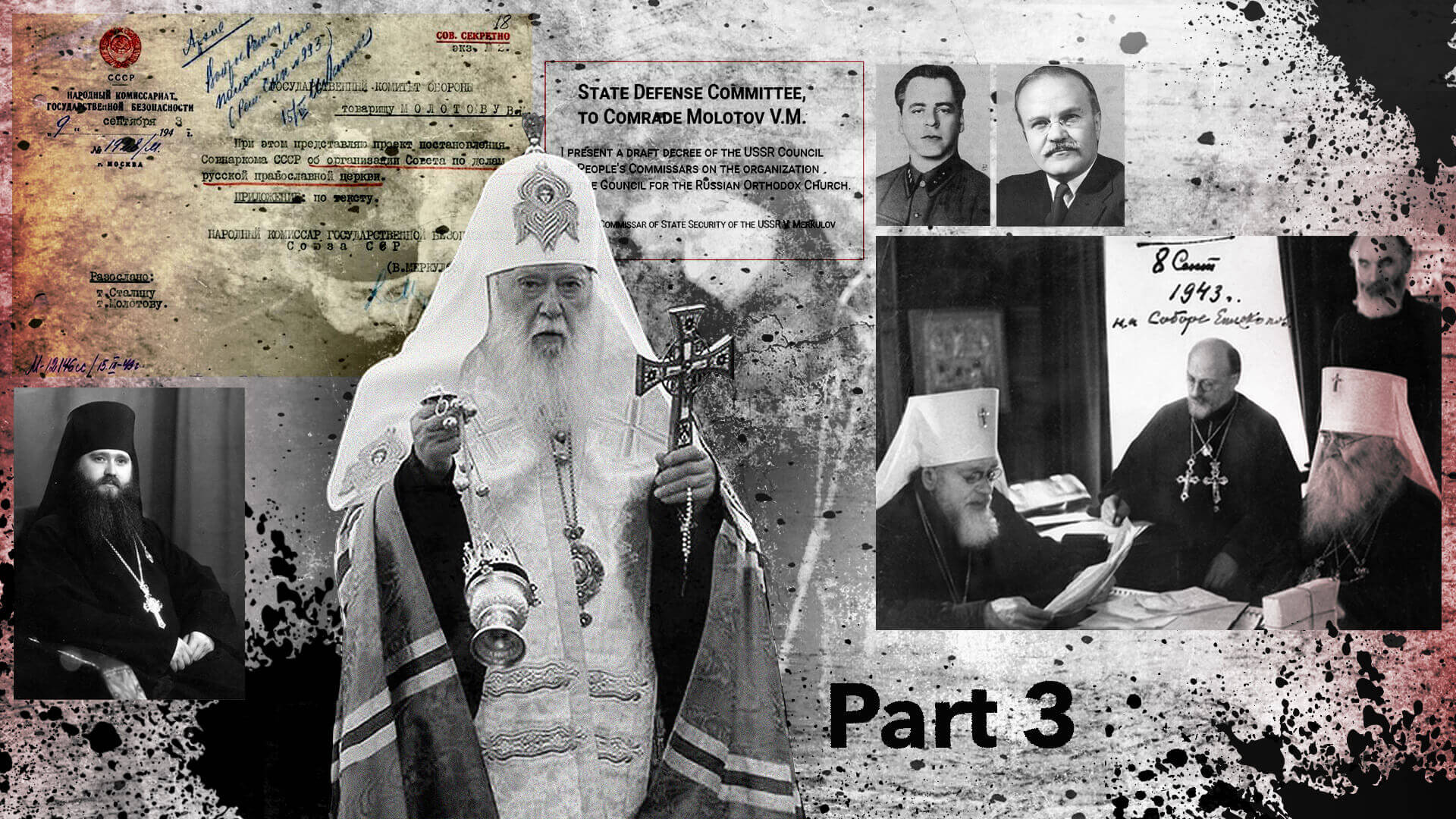This article continues a series of publications about the connections between agents of the international anticult network and Russian intelligence agencies. Previous articles (Part 1 and Part 2) discussed ties between members of the Latvian branch of FECRIS and the exposed FSB agent, Latvian MP Tatjana Ždanoka. Here, we will examine FSB’s influence on the international anticult network through its Russian representatives.
It is worth recalling that the ideological and coordinating center of international anticultism is currently located in Russia: it is the Russian pro-religious association RACIRS headed by Alexander Dvorkin. Since 2009, the president of Russian RACIRS also served as vice president of the European anticult federation FECRIS, and since 2022, he has been a member of the FECRIS board of directors. Alexander Dvorkin has repeatedly been spotted in close interaction with individuals and organizations directly connected to the FSB (the current successor to the Soviet KGB). Relevant facts have already been partially exposed on the portal actfiles.org.
Ties with the FSB are not limited to the president of RACIRS: other Russian anticultists are also linked to this intelligence agency. Notably, this hasn’t prevented some of them from attending FECRIS conferences in European countries and holding membership in the federation.
Let’s examine the activities of Alexander Dvorkin’s colleague, Roman Silantyev , based on his own statements about working for the FSB, as well as his anti-Ukrainian activities and close connections with European and American anticultists.
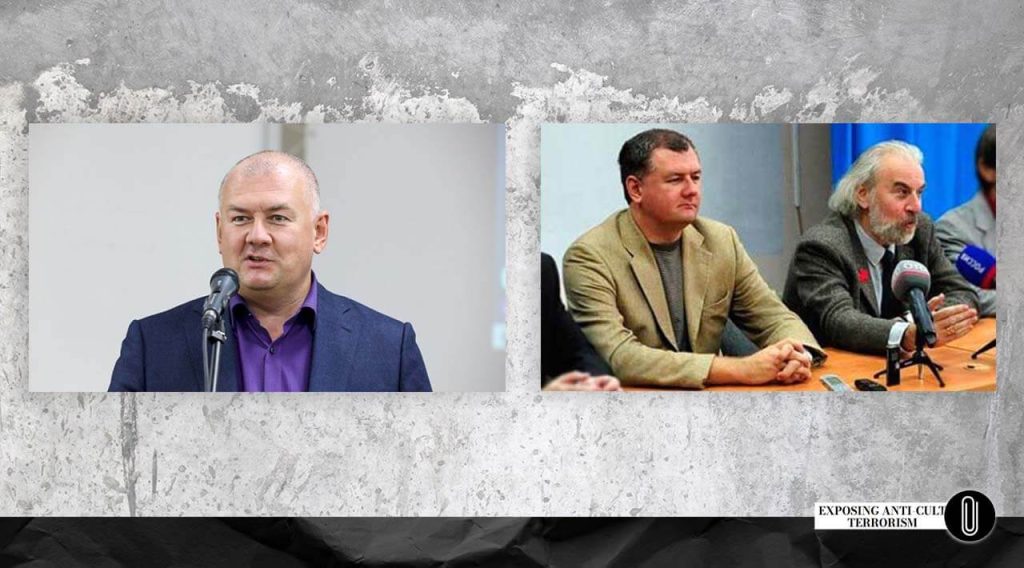
Roman Silantyev’s connection to the FSB
In 2019, Roman Silantyev confirmed that he collaborates with the FSB. According to him, he lectures intelligence officers on destructology and prepares expert reports on terrorist organizations 1.
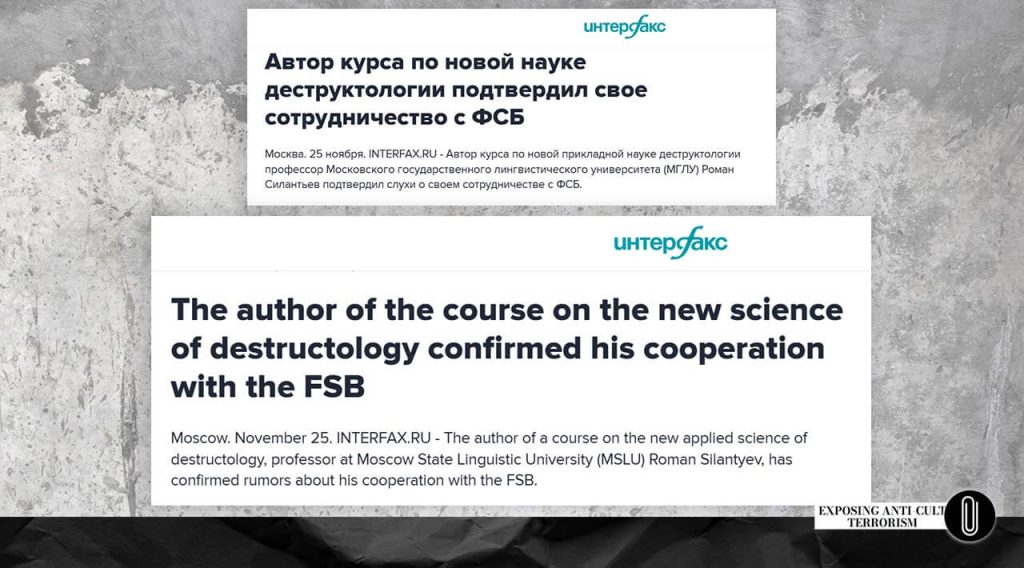
Destructology is a discipline invented by Roman Silantyev in 2019. As the creator of destructology himself admitted, “Well, yes, two years ago I came up with a new applied science. Many doctors of science are guilty of doing that. It’s considered that you’re not a real doctor unless you invent some new science.” 2
“It’s a kind of greatly expanded sectology that allows us to deal not only with cults and sects, but also with mages, psycho-cults, youth subcultures, terrorists, and generally everything that is dangerous to the human soul…” 3.
It is noteworthy that he prepares expert reports for the FSB. In 2009, Roman Silantyev was appointed deputy chairman of the Expert Council on State Religious Evaluation under the Russian Ministry of Justice. Alexander Dvorkin was appointed the council chairman. It is quite logical to assume that these two anticultists have been collaborating with the FSB in compiling religious expert reports at least since the beginning of the council operation in 2009. However, given that appointments to such positions in the Russian Ministry of Justice as those held by RACIRS president Dvorkin and his colleague Silantyev cannot occur without oversight from Russian intelligence agencies, it is likely that their cooperation with the FSB began long before the actual appointments.
Incidentally, in that same year 2009, an international anticult symposium of FECRIS was held in St. Petersburg, where Alexander Dvorkin was elected the new vice president of FECRIS. The role of St. Petersburg as a coordination and interaction center for Russian intelligence agents with their counterparts operating in other countries, as well as a meeting place for agents with their supervisors, was previously revealed in the article “Ways of FSB Agents Infiltration in Europe. The Anticult Movement is Just One of Them: Part 1.”
Currently, almost no legal case banning a religious organization in Russia proceeds without Silantyev’s involvement.
Roman Silantyev at the FECRIS congress in Sofia, Bulgaria
In 2016, a FECRIS conference was held in Sofia, Bulgaria, attended by its members from various countries. Official documents confirm that Roman Silantyev was among the participants 4, 5.
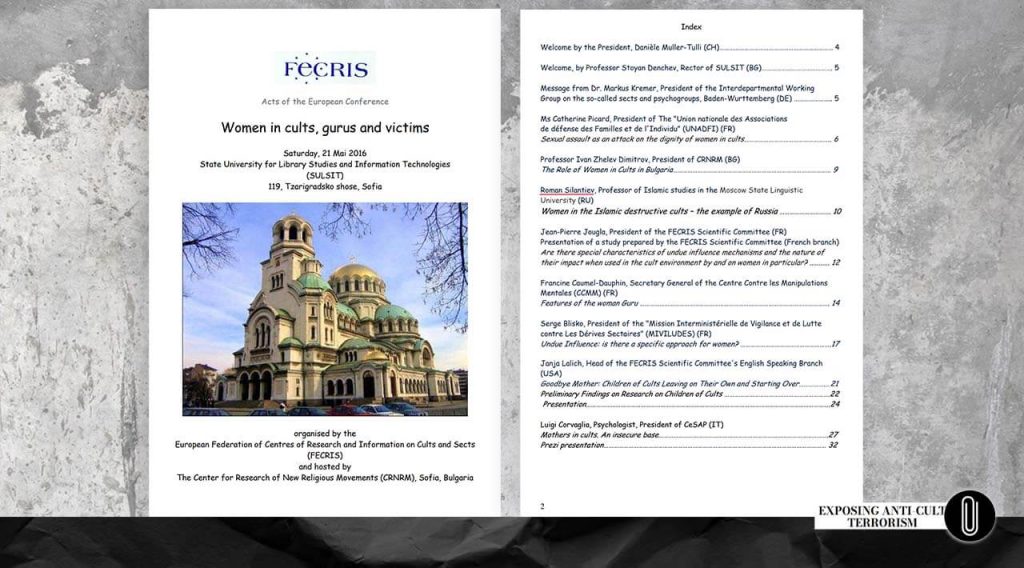
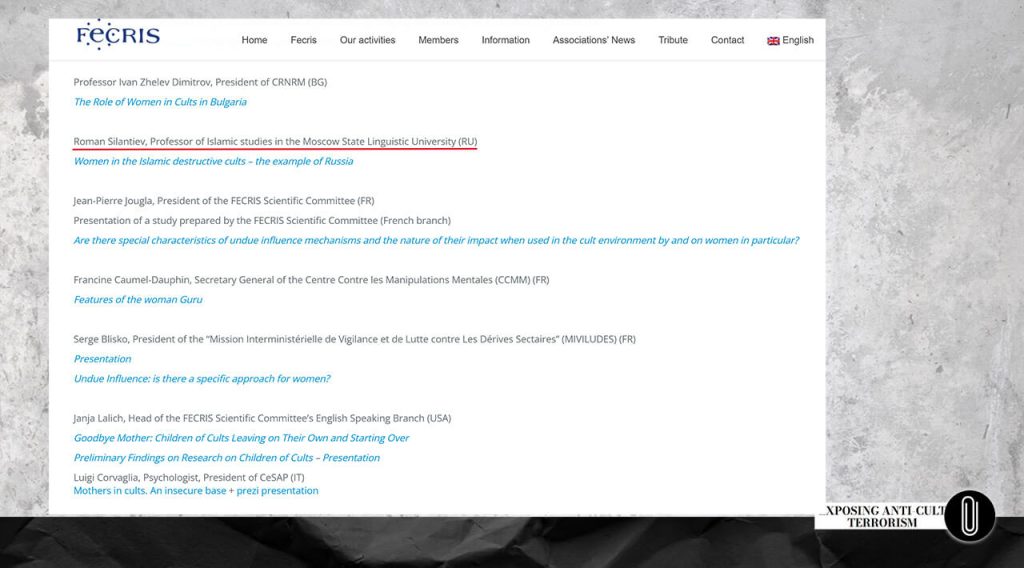
Along with Alexander Dvorkin and Roman Silantyev, the conference attendees included Branka Dujmić-Delcourt, Luigi Corvaglia, André Frédéric, Janja Lalich, and other representatives of the anticult network from France, Belgium, Croatia, Italy, Spain, Bulgaria, Switzerland, Germany, Austria, the UK, Finland, and the USA 6.
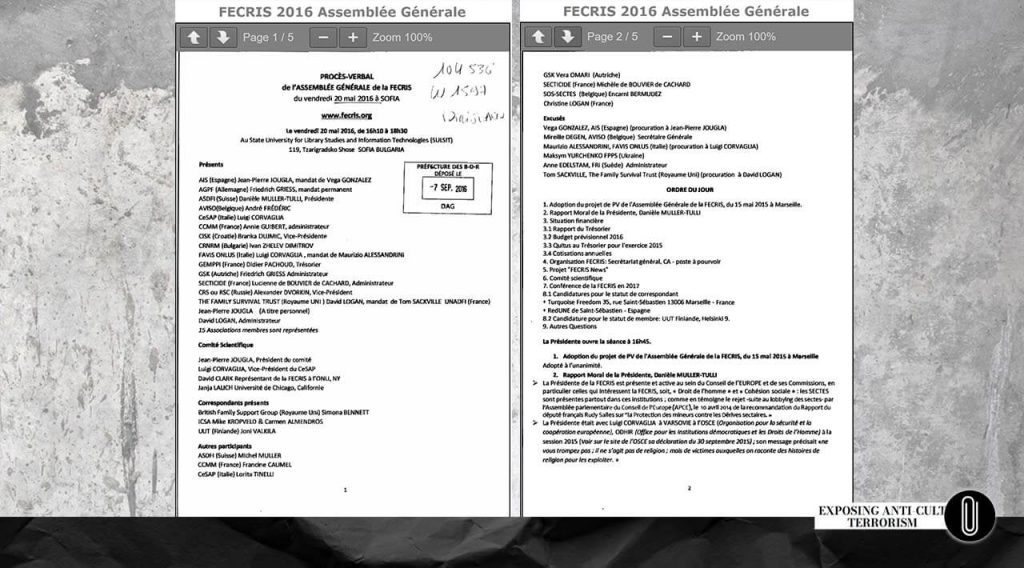
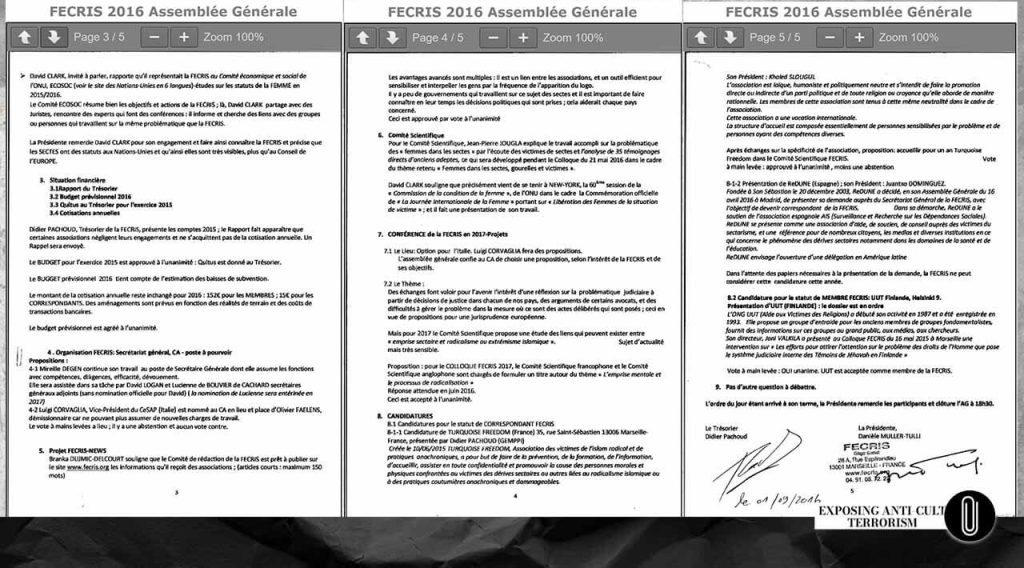
The former MIVILUDES president Serge Blisko shared the stage with Roman Silantyev and Alexander Dvorkin 7. Articles on actfiles.org have earlier mentioned MIVILUDES members who compromised themselves by supporting Russia’s occupation of Crimea. It should be recalled that in 2019, another former MIVILUDES president, Georges Fenech, became part of a delegation led by French MP Thierry Mariani that visited occupied Crimea. The trip was funded and organized by the Russian government. Among those who welcomed the delegation was Leonid Slutsky, chairman of the Russian State Duma’s Committee on International Affairs. The purpose of the French delegation was to showcase how prosperously Crimea was supposedly doing under Russian occupation.
* MIVILUDES is a French government agency established to combat so-called “sects” and noted for its close and long-standing cooperation with FECRIS and Russian anticultists.
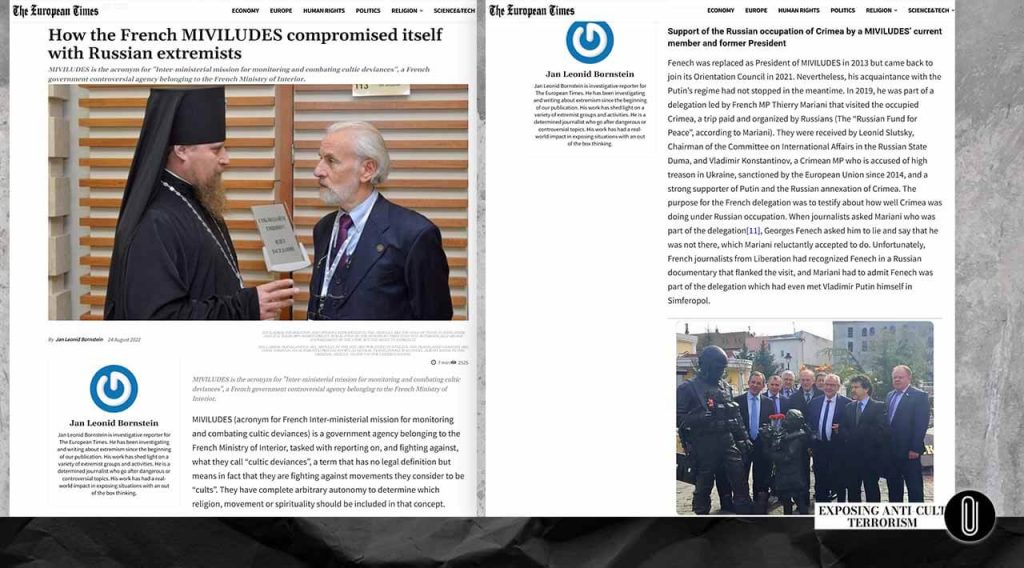
Roman Silantyev’s role in the World Russian People’s Council (WRPC) established by the Russian Orthodox Church
Investigation of the activities of Dvorkin’s colleague, anticultist Roman Silantyev, and the positions he’s been holding in various organizations sheds new light on the French delegation’s visit to Crimea in 2019 and the involvement of anticult player and former MIVILUDES president Georges Fenech in that visit. Now, let’s explore some aspects of Silantyev’s activities.
Since 2006, Roman Silantyev has been actively engaged in the World Russian People’s Council (WRPC) established by the Russian Orthodox Church (ROC). WRPC was created in 1993 on the initiative of then-Metropolitan Kirill (Gundyaev), now the ROC Patriarch 8. It is interesting that WRPC emerged in the same year when Alexander Dvorkin launched the anticult movement in Russia under the ROC patronage and founded the Center for Religious Studies in the name of Hieromartyr Irenaeus, Bishop of Lyons.
* In the same year 1993, synchronously with Russia, anticult activities were launched in other countries of the world, including Spain where the idea of creating the French FECRIS was voiced at an anticult symposium, and the Czech Republic where an anticult association Society for the Study of Sects and New Religious Movements was founded.
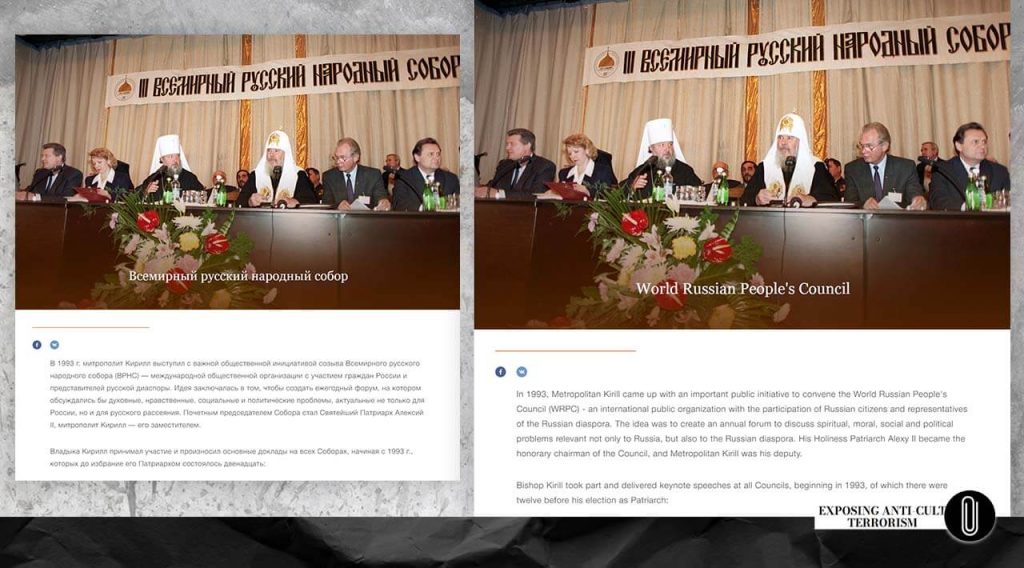
WRPC is currently led by the ROC Patriarch Kirill, while its vice president until 2024 was Orthodox oligarch Konstantin Malofeev, the founder of Tsargrad TV9. The Tsargrad portal owned by Malofeev frequently cites anticultist Roman Silantyev. Silantyev used to serve as executive director of WRPC programs. Today, he heads the WRPC Human Rights Center 10 and sits on the WRPC Presidium alongside figures such as Sergey Shoigu, Yelena Mizulina, Vladimir Medinsky, Alexander Dugin, and Leonid Slutsky 11.
Let’s recall that Leonid Slutsky was mentioned above in connection with the Crimea visit of the French delegation including Thierry Mariani and former MIVILUDES president and anticultist Georges Fenech. As it turns out, French MP Thierry Mariani who led the delegation had previously visited the Crimean Peninsula in 2015 and 2016, also at the invitation of Slutsky. The key figure financing those trips was the Orthodox oligarch Konstantin Malofeev. This was highlighted in 2015 by The Insider in an investigative article, “French Kiss: How French Parliamentarians Help Promote the Kremlin” 12.
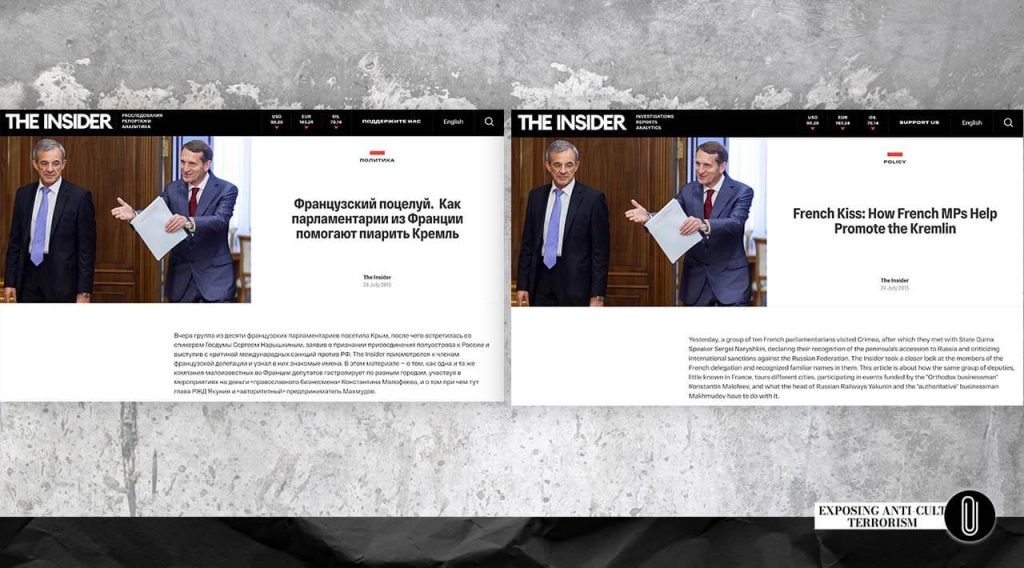
“Yesterday, a group of ten French MPs visited Crimea, after which they met with State Duma Speaker Sergei Naryshkin, declared their recognition of the peninsula’s accession to Russia, and criticized international sanctions against the Russian Federation. The Insider took a closer look at the members of the French delegation and recognized familiar names among them. This article is about how the same group of MPs little known in France tours different cities, participating in events funded by the ‘Orthodox businessman’ Konstantin Malofeev…”
Thanks to The Insider’s investigation, Thierry Mariani’s ties were found to extend beyond Konstantin Malofeev up to Sergey Naryshkin. We’d like to talk about the latter in more detail since Naryshkin is the director of Russia’s Foreign Intelligence Service (SVR) that succeeded the KGB’s First Chief Directorate and the closest ally of Vladimir Putin. Latvian MP Tatjana Ždanoka also admitted having meetings with both Naryshkin and Putin after leaked emails exposed her work for Russian intelligence under the supervision of FSB Fifth Service officers. This revelation was covered in The Insider’s article, “Exclusive: Latvian Member of European Parliament is an agent of Russian Intelligence, leaked emails confirm” 13:
“Leaked emails between Ždanoka and her two known Russian case officers include explicit, detailed reports from Ždanoka to her handlers, describing her work as a European legislator, particularly as those official duties relate to fostering pro-Kremlin sentiment in her native Baltic region. Other correspondence involves arranging physical meetings in Moscow or Brussels between Ždanoka and her Russian handler, along with requests for funding from Russian sources to underwrite her political activities in Latvia and the European Parliament.”
“According to the emails, her first case officer was a veteran FSB cadre from the St. Petersburg central directorate, Dmitry Gladey, 74, who ran Ždanoka from approximately 2004 to 2013. After 2013, Ždanoka was in regular contact with Sergei Beltyukov, an FSB operative since 1993.”
“‘I can testify that the only people with whom I have sat at the same table, and with the certain knowledge that they are/were Russian FSB officers, are Vladimir Putin and Sergei Naryshkin,’ Ždanoka said. (Naryshkin is the current director of Russia’s Foreign Intelligence Service (SVR), successor of the KGB’s First Chief Directorate).”
We previously referenced the FSB agent Tatjana Ždanoka in our article “Ways of FSB Agents Infiltration in Europe. The Anticult Movement is Just One of Them: Part 1”, noting that members of her political party, the Latvian Russian Union (LKS), included Latvian anticultists affiliated with FECRIS as well as colleagues of Alexander Dvorkin and other anticult agents across various countries. Furthermore, Ždanoka directly interacted with Dvorkin himself.
Yet, let’s go back to The Insider’s investigation on Thierry Mariani 12. An excerpt from the article “French Kiss: How French Parliamentarians Help Promote the Kremlin” reveals the depth of his connections:
“A little earlier, the same Mariani visited the Economic Forum in St. Petersburg, and even earlier, Naryshkin himself came to Paris where he met with Mariani and his colleagues.”
“Who pays for all those trips? It’s unclear who funded the French delegates’ visit this time, but last year, the sponsor and organizer of a similar event was revealed by ‘Anonymous International’ to be the ‘Orthodox entrepreneur’ Konstantin Malofeev. He had previously been accused of corporate raiding and was the subject of a criminal case that was quickly closed following his active role in organizing hostilities in southeastern Ukraine.” Thierry Mariani himself admitted that he knows Malofeev personally.
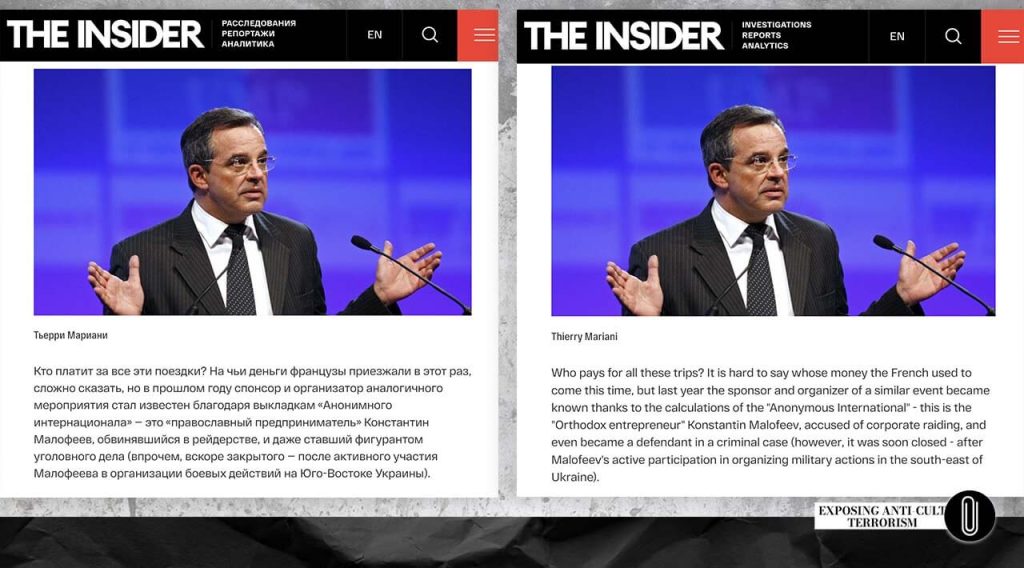
This article touches only briefly on the activities of two anticult agents, the Russian and the French one, both being connected with Konstantin Malofeev to varying degrees. While this connection might seem incidental in isolated cases, it is far from unique. The objectives pursued by anticult agents in European countries often suspiciously align with those of their Russian counterparts, benefiting the ideologues of the Russian World narrative.
Additionally, the influence of ROC and FSB on the anticult movement further undermines the credibility of anticultists. In this regard, we cannot but mention that Malofeev has been directly participating in the informational and ideological promotion of the Russian World throughout the Russo-Ukrainian war. He was also heavily involved in the media preparation for the military conflict in eastern Ukraine.
Here, it is worth recalling the long-standing antidemocratic activities of Ukrainian anticult agents controlled by Alexander Dvorkin. Acting as mouthpieces for their Russian supervisors from RACIRS, they carried out operations to destabilize Ukraine, demoralize its population, recruit new agents, ideologically condition Ukrainian citizens, introduce antidemocratic Nazi rhetoric into Ukrainian media favorable to Kremlin propagandists, disseminate disinformation and propaganda, and spread the Russian World ideology. For more details, read the article “Europe, Open Your Eyes if You Don’t Want War”.
In light of new information linking the two anticultists to the prominent Russian propagandist and Orthodox oligarch Konstantin Malofeev, the information warfare waged among Ukrainian citizens by recruited agents posing as anticult activists takes on a whole new perspective. The Russian World is a tight-knit network, and its agents operate with fine-tuned organization and coordination, in perfect alignment with its central hub in Russia. Today, we can see the results of this network’s efforts in the bloodshed and deaths of innocent Ukrainian civilians.
To understand what RACIRS’ anticult agents are aiding in democratic countries, it is essential to note another widely known fact about Malofeev. He is considered one of the main sponsors of the so-called Donetsk and Luhansk People’s Republics (DNR and LNR), while his associates were directly involved not only in the information warfare, but also in the initial outbreak of military conflict in eastern Ukraine in 2014. Igor Strelkov (Girkin), a close associate of Malofeev 14, admitted that his unit actually started the war in Ukraine. He shared this in an interview with the newspaper “Zavtra” 15 in 2014.
“The wheel of war that continues to this day was set in motion by our unit.” — Igor Strelkov
Russian World ideology in WRPC activities and Silantyev’s rhetoric
The ideology of the Russian World is also reflected in the activities of WRPC and the rhetoric of Roman Silantyev. For example, on March 27, 2024, WRPC convened its 25th session during which the participants approved a mandate (commanding resolution) titled “The Present and Future of the Russian World.” Below is an excerpt from this mandate published on the official website of ROC (MP), where the war in Ukraine is described as “holy” 16:
“The special military operation is a new stage of the national liberation struggle of the Russian people against the criminal Kiev regime and the collective West behind it, conducted in the lands of South-Western Rus’ since 2014. During the SMO, the Russian people with arms in their hands defend their life, freedom, statehood, civilizational, religious, national, and cultural identity, as well as the right to live on their own land within the borders of the united Russian state. From a spiritual and moral point of view, the special military operation is a Holy War in which Russia and its people, defending the unified spiritual space of the Holy Rus’, fulfills the mission of the ‘Holder,’ protecting the world from the onslaught of globalism and the victory of the West that has fallen into satanism.
After the end of SMO, the entire territory of modern Ukraine should enter into a zone of exclusive influence of Russia.”
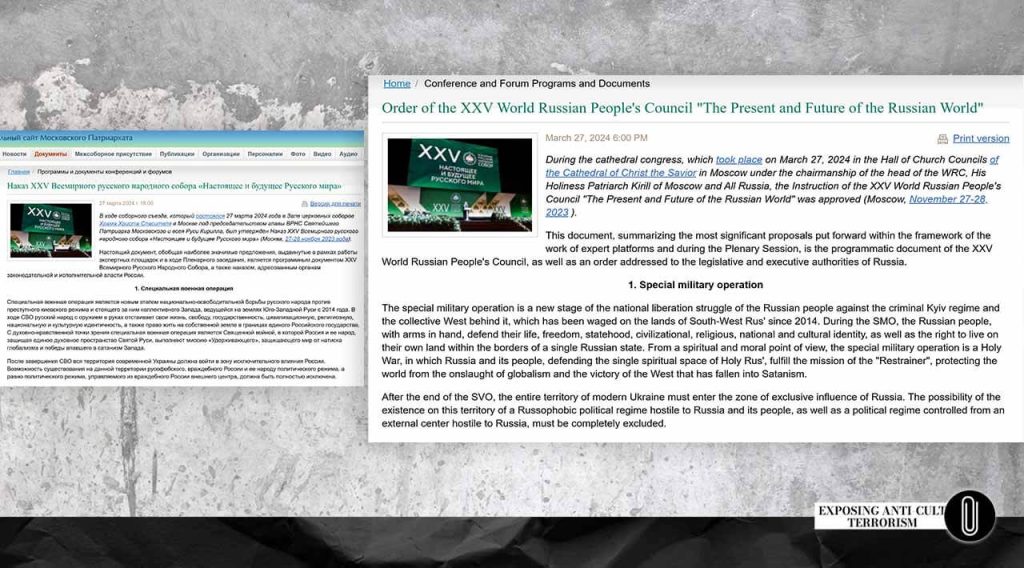
At the same WRPC session, discussions also addressed migration policy, or rather anti-migration policy. Details on the anti-immigrant and anti-Islamic narratives including those reflected in the WRPC mandate were previously noted in the article “At The Threshold of a Civilizational War”.
Roman Silantyev is known for his radical anti-Islamic views, too. For instance, in 2016, when commenting on his report titled “Ethno-Religious Threats,” Silantyev made an almost explicit call for violent shooting of Muslims in Russia. Here’s an excerpt from an article on the “Golos Islama” (“Voice of Islam”) portal 17, analyzing his report:
“The report clearly indicates that this doesn’t only concern Wahhabis. The stated figure of 700,000 and the listed regions of concern suggest that nearly every Muslim who adheres to Islamic laws is targeted. Moreover, labeling the Caliphate idea as a terrorist threat obviously points to the pursuit of eliminating all dedicated Muslims.”
“‘We must drastically toughen legislation and stop thinking that peaceful negotiations and agreements can solve anything. We simply need to exterminate them. Just as we killed fascists, we must kill Wahhabis,’ the religious scholar concluded.”
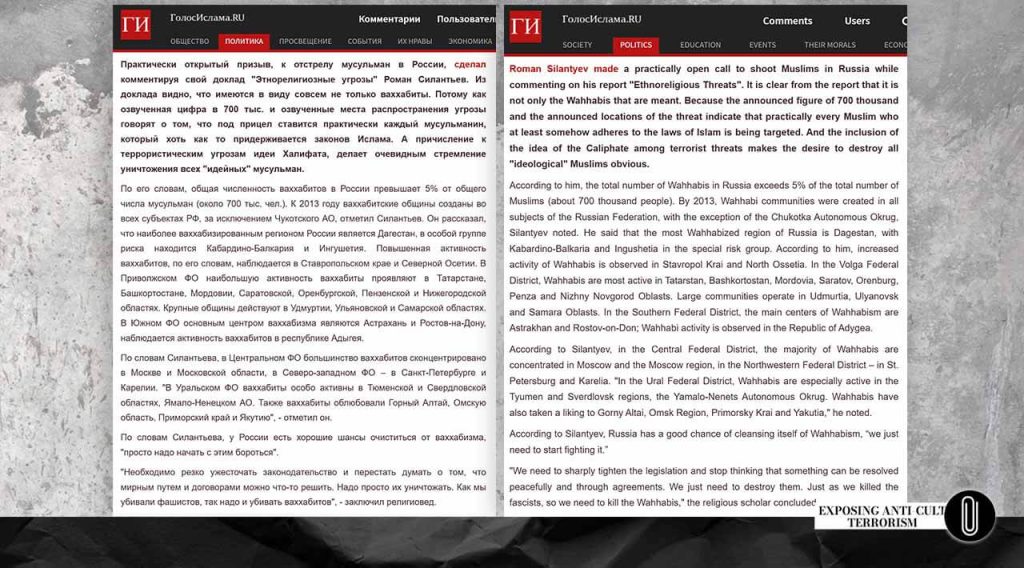
Earlier, in 2015, Damir Khayretdinov, rector of the Moscow Islamic Institute, asked the Interior Ministry to investigate Silantyev’s publications for inciting hatred. Instead, the agency initiated an investigation into Khayretdinov himself. Silantyev later commented that this was the fifth time authorities had refused to pursue charges against him following the Mufti Council request 18.
Silantyev’s anti-Muslim rhetoric is supplemented by his extreme anti-Ukrainian and anti-Western sentiments, which is a hallmark of any RACIRS member. For decades, RACIRS narratives have been portraying Ukraine as overrun by “Nazis” and “Western cultists” and as the country that needs to be “denazified.” This very narrative ultimately became the official justification for Russia’s full-scale invasion of Ukraine on February 24, 2022. Despite accusing Ukrainians of Nazism, Silantyev himself has been noted for outright antisemitic statements and even condemned by the Russian Jewish Congress.
Anti-American stance in FECRIS ideology
Throughout its existence, the European Federation of Centres of Research and Information on Cults and Sects (FECRIS) has been rooted in anti-American conspiracy theories. Many European anticultists claim that an American conspiracy seeks to weaken Europe’s national identity by introducing American “cults” into European countries. To support these ideas, anticultists frequently cite a 1996 book “The Mafia of Cults ” and a 2001 article by French anticult journalist Bruno Fouchereau, “Sects: Trojan horse of the United States in Europe ” 19.
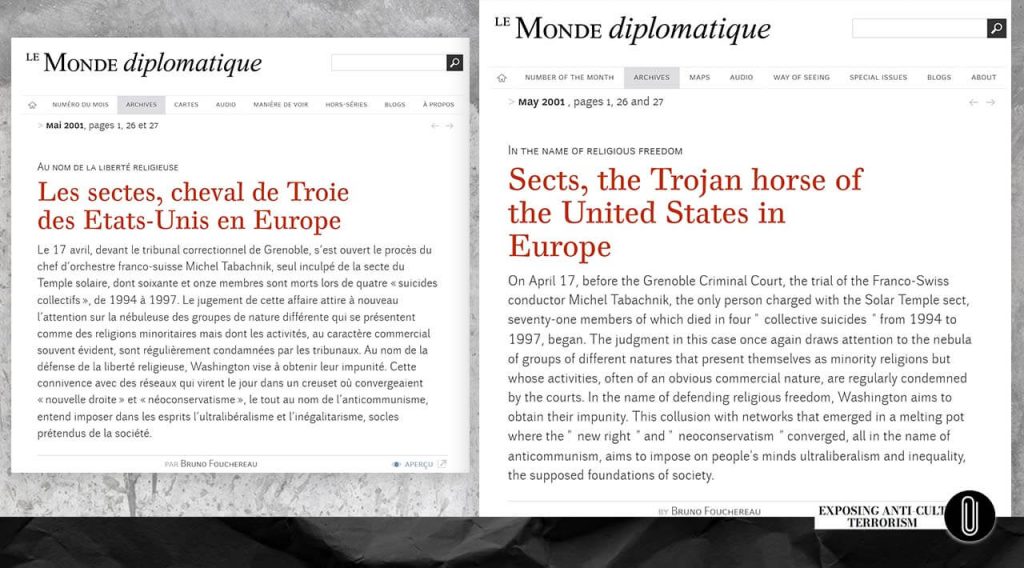

This standpoint quite accurately aligns with that of Russian ideologues and propagandists who similarly argue that the “spiritual security” of the Russian World is under threat. In this narrative, blame is projected onto the collective West and alleged American conspiracies which, through “cults,” infiltrate Russia and neighboring countries, including Ukraine that is regarded as an integral part of the Russian World.
The belief among FECRIS members in the existence of an American conspiracy is also evidenced by some anticult conferences. For instance, in 2005, a conference was held in Madrid, Spain 20.
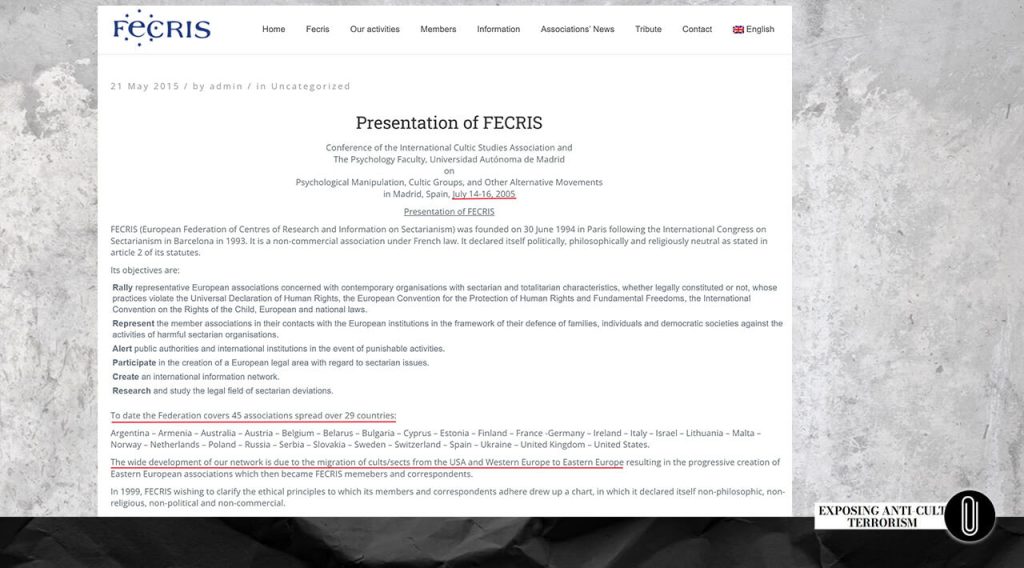
On FECRIS’s official webpage covering the event, the rationale for the emergence of anticult efforts overall reads as follows:
“The wide development of our network is due to the migration of cults/sects from the USA and Western Europe to Eastern Europe, resulting in the progressive creation of Eastern European associations which then became FECRIS members and correspondents.”
Here, we’d like to highlight one more point that will be explained later in the article:
“In 1999, FECRIS, wishing to clarify the ethical principles to which its members and correspondents adhere, drew up a chart in which it declared itself non-philosophic, non-religious, non-political and non-commercial.”
Features of Russian intelligence agencies’ influence abroad
The Kremlin’s influence abroad is exerted through various channels, with a key role played by the federal government agency Rossotrudnichestvo. This agency officially claims to promote cultural, educational, and humanitarian ties between Russia and other nations and has representative offices in 134 countries worldwide. In reality, Rossotrudnichestvo is a primary driver of the Kremlin’s “soft power,” engaging in espionage and recruitment of agents, with FSB and SVR personnel operating within its ranks. These findings were revealed by the Dossier Center in its investigative article, “What is Rossotrudnichestvo, and what is it needed for?” 21.
* Dossier Center, a nonprofit project by Mikhail Khodorkovsky, investigates and analyzes corrupt connections involving Russian politicians and intelligence officers. It aims to support the establishment of the rule of law in Russia by documenting and disseminating investigative journalism findings.
We highlight this example so as to quote the words of Rossotrudnichestvo head, Yevgeny Primakov (grandson of the late former SVR director Yevgeny Primakov). His remarks made in 2020 are quite revealing and provide insight into the evolving strategies of Russian intelligence agents abroad 22:
“There will be entirely different criteria for the efficiency of our overseas centers. Those include the number and quality of organizations and non-governmental groups engaged in our work, such as NGOs or groups of people united by a common idea. We need to involve them in our activities.
Moreover, it is completely unnecessary for them to act under pro-Russian political slogans. Yes, we would like to receive political support and solidarity, but this is not always possible, and we understand that. We should definitely seek out people, for instance, in the UK, who would say, ‘Yes, Crimea is Russian.’ But where we cannot find such people, we must identify points of solidarity on any other issues of common interest. There are UN development goals, general issues like combating terrorism, poverty, diseases, and COVID. Even on non-political matters, we must find common ground. The more we engage the non-governmental sector and independent NGOs, the greater the response we will receive. Rossotrudnichestvo must continually create these points of solidarity.”
At first glance, Russian agents abroad are supposed to act under overtly pro-Russian political slogans. However, as we see, that’s not necessarily the case. Similarly, declarations of independence by certain organizations cannot always be taken at face value. This brings us back to the FECRIS statement cited earlier, where the anticult federation proclaimed itself non-philosophic, non-religious, non-political, and non-commercial. Yet, as we can see, Russian intelligence targets independent nonprofit NGOs even in democratic countries.
How then can you discern truth from lies? When is democracy being defended, and when is it merely a facade serving antidemocratic forces? It is critical to scrutinize the results of an organization’s actions: do they fully align with its stated goals, or do they achieve the exact opposite? Quoting an eternal truth from Christianity, “Thus you will recognize them by their fruits.” — The Holy Bible, Matthew 7:20 (ESV)
In the case of the international anticult network, when questioning whose goals they serve and whose interests they advance, the answer becomes increasingly rhetorical in light of their overtly antidemocratic activities and discrediting connections. To substantiate this statement further, we will present additional facts.
Double standards and lies of anticult players
Since the full-scale Russian invasion of Ukraine, many anticult representatives have been observed shifting their rhetoric to distance themselves from their Russian counterparts within RACIRS. Moreover, in April 2022, just a couple of months after the war began, references to FECRIS’ affiliate organizations in Russia mysteriously disappeared from its website. While it might be tempting to believe that the anticult players in Europe reconsidered their support for the war and its ideologues, the reality is far more cynical. This kind of public gesture of removing information from the official website appears to be nothing more than a smokescreen. The example of Roman Silantyev, the Russian anticultist working closely with the FSB, reinforces this conclusion.
On June 28–29, 2022, Roman Silantyev visited the Donbas region 23. During a round table titled “Youth of the World Against Extremism in All Its Forms,” he introduced students from the occupied territories to his fabricated “destructology” science which he describes as “expanded sectology.” He also propagated anti-Ukrainian and anti-Western ideology there.
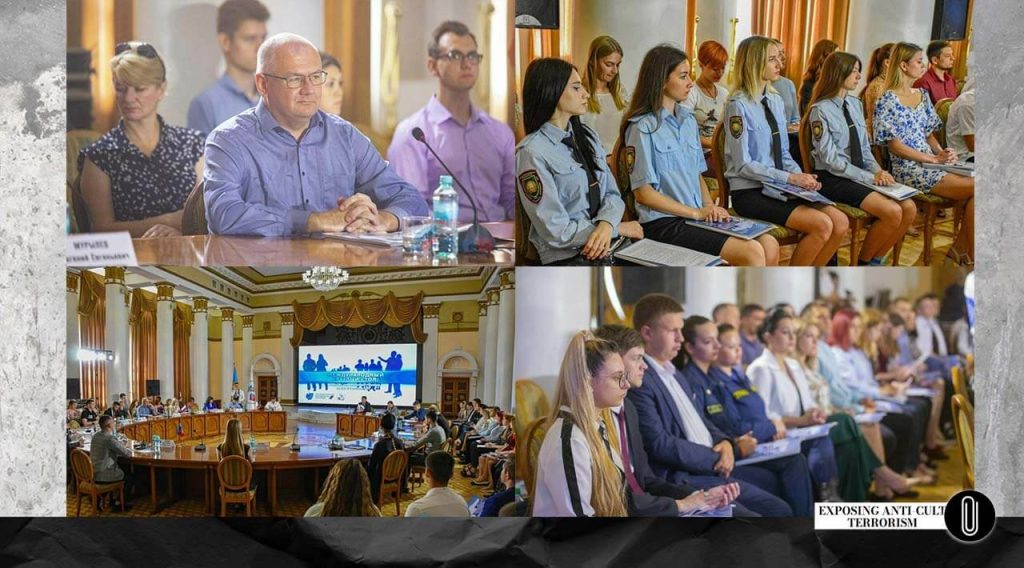
Despite this fact, despite the brutal hostilities in Ukrainian cities at that time and deaths of countless innocent civilians, and despite Silantiev’s longstanding collaboration with the FSB and his questionable affiliations, he attended an anticult conference in Paris less than a month later, on July 15, 2022. The event focused on “the influence of religious cults on mental health, social relations, and politics.” The conference was opened by Didier Pachoud, FECRIS treasurer and the leader of GEMPPI, the French branch of FECRIS. In September 2022, a press release about the event, titled “How cults affect mental health, social relations and politics,” was published 24.
The press release included the following statement regarding Roman Silantiev’s participation: “Professor Roman Silantiev talked about the new applied science called ‘destructology,’ which studies destructive ideologies of both religious and secular nature.”
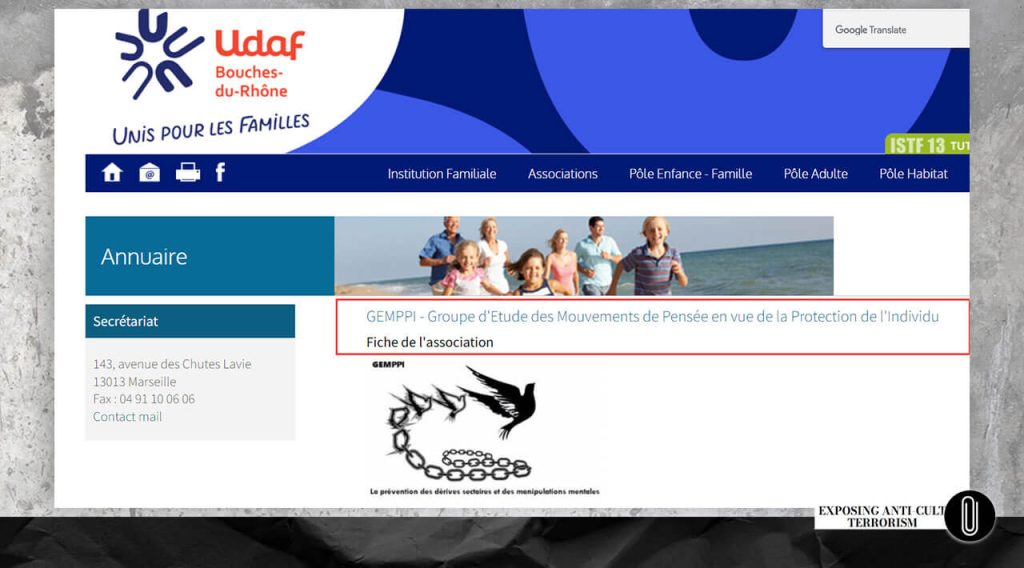
What does this incident reveal? It suggests that the international network of anticult agents operates as a unified entity coordinated by a single ideological center, and it is immune to world events, laws, democratic values, human rights, or genuine concern for people. Anticult players have never truly abandoned the ideology or views of their Russian colleagues in RACIRS, nor have they distanced themselves from the ideology of war, destruction, and Nazism. On the contrary, representatives of the anticult movement, regardless of the countries they operate in, continue to collaborate. They pursue shared antidemocratic, destabilizing goals, target dissenters, and promote the rise of totalitarianism and Nazism, all while cynically masking their actions under the guise of anticult rhetoric.
Sources:
1. https://www.interfax.ru/russia/685440
2. https://www.youtube.com/watch?v=sWKy1yQTH5k
3. https://www.youtube.com/watch?v=7XPaVB0-v18
4. https://www.fecris.org/conferences/sofia2016/Acts_SofiaEN_update_30.04.2021.pdf
5. https://www.fecris.org/uncategorized/women-in-cults-gurus-and-victims/
6. https://sectes-info.com/fecris-statuts-et-membres/
7. https://europeantimes.news/2022/08/how-the-french-miviludes-compromised-itself-with-russian-extremists/
8. https://patriarch.patriarchia.ru/vsemirnyy-russkiy-narodnyy-sobor/
9. https://vrns.ru/news/konstantin-malofeev-izbran-zamestitelem-glavy-vsemirnogo-russkogo-narodnogo-sobora/?sphrase_id=6098
10. https://vrns.ru/news/pravozashchitnyy-tsentr/
11. https://vrns.ru/o-vrns/prezidium.php
12. https://theins.ru/politika/11446
13. https://theins.ru/en/politics/268694
14. https://books.google.de/books?id=7dWgEAAAQBAJ&newbks=0&printsec=frontcover&pg=PA148&dq=Russian+Orthodox+nationalist+and+investment+fund+billionaire&hl=en&redir_esc=y#v=onepage&q=Russian%20Orthodox%20nationalist%20and%20investment%20fund%20billionaire&f=false
15. https://zavtra.ru/blogs/kto-tyi-strelok
16. http://www.patriarchia.ru/db/text/6116189.html
17. https://golosislama.com/news.php?id=17104
18. https://novayagazeta.ru/articles/2023/05/06/tsaritsa-nauk-media
19. https://www.monde-diplomatique.fr/2001/05/FOUCHEREAU/1765
20. https://www.fecris.org/uncategorized/presentation-of-fecris/
21. https://dossier.center/rossotr/
22. https://iz.ru/1033306/nataliia-portiakova/slozhno-predstavit-cheloveka-v-zdravom-ume-kotoryi-poshel-chitat-sait-rossotrudnichestva
23. https://vrns.ru/news/roman-silantev-provel-v-luganske-seminary-po-destruktologii-i-metodakh-borby-s-satanizmom/
24. https://web.archive.org/web/20221002092113/https:/www.timesnewswire.com/pressrelease/how-cults-affect-mental-health-social-relations-and-politics/

